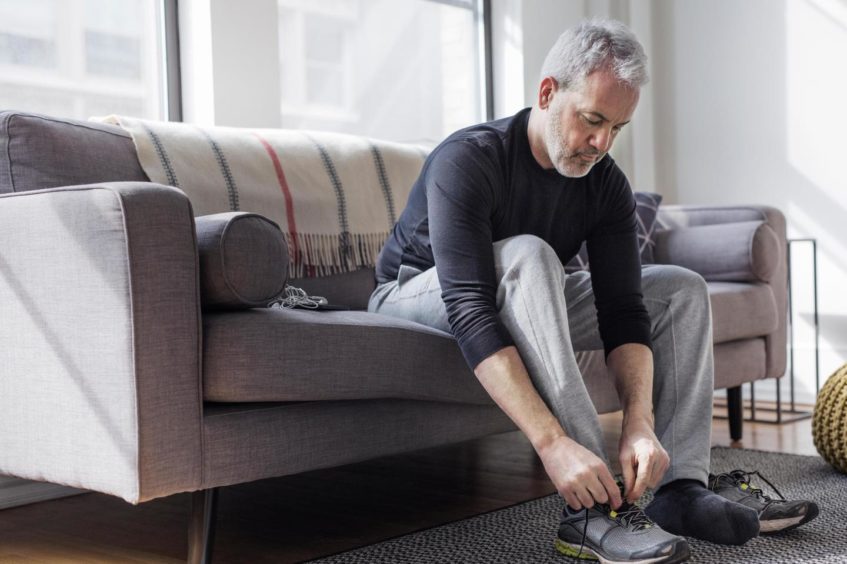Being a man is bad for your health. Or so says Jeff Foster – and as a GP, male health specialist and a man himself, he should know.
“Compared with women, men not only have a greater chance of contracting almost every illness, but they die sooner too,” says Foster, who has now authored new book Man Alive: The Health Problems Men Face And How To Fix Them.
Part of the problem, he says, stems from the fact that as they grow up, males are “generally encouraged to avoid looking after their health” – despite the plethora of self-help books pitched at helping them gain six-pack abs and the body of an Adonis.
“But men’s health is more than looking good,” Foster points out. “As children, we’re told not to ‘cry like a girl’, and ‘man up!’, and this internalisation of health problems continues as we develop.
“Men are conditioned to develop health practices and habits that increase their risk of disease and make it harder for them to seek medical advice.”
It doesn’t have to be that way, though. “Bad health isn’t inevitable for men. The key is to empower men with the knowledge they need to understand their own bodies and minds.”
Here, Foster outlines some common men’s health issues, and how to deal with them.
Testosterone deficiency or ‘manopause’
“Nearly a million men are affected by low testosterone, and numbers are increasing each year. Testosterone deficiency, also known as andropause or ‘manopause’, mimics a lot of the symptoms seen in female menopause. However, it can affect men from age 30-90 years.
“Symptoms include tiredness, falling asleep at the end of the day, decreased libido, increased body fat/decreased muscle, poor concentration/brain fog, and being more irritable. In the later stages, men may also suffer night sweats, changes to cholesterol and blood pressure, diabetes risk, and osteoporosis.
“Diagnosis is via a simple blood test, which has to be interpreted correctly, and in the context of the patient as a whole. Treatment involves fixing the cause, or going on to testosterone replacement therapy (TRT), which when used properly can be life-changing.”
Mental health
“Around one in eight men in the UK will suffer mental health problems at some point. Male attitudes towards mental health remain resistant to change, and while I now see plenty of younger men with depression or anxiety symptoms, it’s still rare to hear a man over the age of 40 talk about his mental health.
“The reason for this is a combination of social, psychological and hormonal pressures that result in many men failing to open up about their mental problems. The first thing is not to assume all mental health problems are psychological. Various medical problems can result in changes in the way we think and should be checked.
“Secondly, we need to start opening up. It doesn’t need to be with a doctor necessarily, but even a friend. Of course, there are medications, talking therapies and a range of other options available, but the key is giving men the tools and social acceptance of being able to say, ‘It’s ok to cry’.”
Prostate disease
“It’s said that if we live long enough, all men will eventually have some degree of prostate cancer. It’s the most common cancer in men, accounting for a quarter of all cancer cases. But despite this, we have no national screening programme. We’re able to diagnose and monitor those cancers that are mild and often don’t require aggressive treatment, but we often miss or can do little for those that grow and spread quickly.
“There are things you can do to reduce your risk of prostate cancer, including avoiding being overweight, exercising regularly, avoiding excess calcium, considering taking vitamin D and getting a regular health check.”
Erectile dysfunction (ED)
“About half of men suffer with ED at some point, yet it remains a taboo subject. Men get ED for a reason; it could be due to neurological or metabolic causes (such as diabetes), anxiety or stress, hormone deficiencies, or narrowing of the blood supply to the penis. In fact, this last cause is so important, it’s accepted that if you have a vascular cause for ED, you have about three years until it affects your heart (resulting in a heart attack). Pills like Viagra can be highly effective in treating ED, but only if you know the underlying cause.”
Cardiovascular health and obesity
“Even with all the fitness, nutrition and wellness information available, obesity levels in men are still climbing every year. As a result, men have higher rates of high blood pressure, high cholesterol, type two diabetes, heart disease and stroke.
“When it comes to exercise, it’s far simpler: everyone should be doing it. There’s no single best type of exercise, but we’re not built to be sedentary, and exercise has been shown to reduce the risks of virtually every medical condition.”




